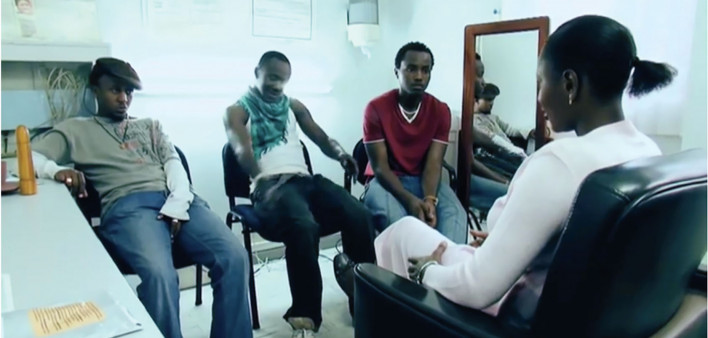A lot of things—from delight to debauchery—COME to mind when we think about MTV. But here’s why you should make a little room in that headspace for the MTV Staying Alive Foundation. Paramount Global’s nonprofit has been educating young people about HIV and sexual health for over two decades through grants, partnerships and the dramatic television series MTV Shuga.
MTV Staying Alive has helped transform how young audiences perceive HIV and the complicated realities of sexual health. A World Bank evaluation—coauthored by Nobel Prize–winning economist Abhijit Banerjee—estimated that every $1 invested in the use of Shuga as an educational tool yielded a health return of $150.
Even MTV’s Butt-Head could recognize how awesome that is.
Georgia Arnold, who cofounded MTV Staying Alive with Bill Roedy in 1998 and served as its executive director for 25 years, shares her insights on how it all came about.
As an American Gen Xer, I hold MTV in a very special place in my heart. Through a child’s eyes, I saw a woman with short hair in a suit (Annie Lennox in “Sweet Dreams”) and a man in drag (Dee Snyder of Twisted Sister) for the first time. Most important, as a teen with HIV, Pedro Zamora’s appearance on The Real World: San Francisco was life-changing.
Your work with MTV has been on the other side of the remote. What was your first impression of the network?
I didn’t really have any impressions at all of MTV growing up in London. It didn’t launch outside the United States until 1987, six years after the U.S. launch. I was off to university, where cable TV didn’t exist.
To be honest, when I walked into MTV to temp for two days in 1993, I had no idea what I was letting myself in for. What’s funny is that music wasn’t in my DNA. I was an MTV innocent.
Not being starstruck by the entity probably gave you a better vantage point to help maximize its reach, particularly where youth and sexual health intersect.
When I started out on this journey, I didn’t have the strongest vision of what MTV Staying Alive could achieve. But I felt that if we could use the brand and add their star power to the mix of powerful messages, we could make a real difference.
I did manage to persuade some very fabulous first funders in the World Bank, UNAIDS, UNICEF, the Kaiser Family Foundation and FHI 360. At the start, it was very much the MTV brand that hooked the funders.
Thank goodness they were starstruck by the brand! When I think of MTV Staying Alive, I think of MTV Shuga, which is basically the best show ever created that deals with HIV on the regular. Tell us more about it.
MTV Staying Alive has been producing MTV Shuga since 2009. The first series, set in Nairobi, starred the then-unknown actress Lupita Nyong’o. If you’ve never seen it, think Netflix’s Sex Education but much more 360. Alongside the TV show, there’s a full digital campaign, radio series, comic books and community education led by young people going into schools.
Some of our most impactful work is when we take the glamorous side of our work off-screen and into the communities. You can go into a school in a rural area of South Africa and watch these kids who’ve been trained by MTV Staying Alive using Shuga content to open conversations about sex.
Too often these conversations are painful, as a young person will open up about the violence in their life. But our trained young people are able to handle these conversations not just with care but to connect them to specialists to support them.
The way that MTV Shuga presents characters living with HIV is unlike anything I’ve ever seen in scripted TV. It’s consistent, it’s realistic and I think young people connect to the show because it’s also a fun watch.
Exactly! The realism is baked into the design of the series. Before one word of a new series is written, there’s an extensive amount of formative research. The writers sit with young people from the community that we’re filming in to understand their day-to-day lives, which in turn ensures that the audience recognize Shuga’s stories as their own.
As an example, before we started scripting for MTV Shuga Down South [set in South Africa], I was in a school in the Western Cape where a young girl told me that “someone has to die” in the new series. When I asked her why, she said, “Well, you said that MTV Shuga reflects our lives…and in our lives, someone always dies.”
How did you handle that suggestion?
Spoiler alert: One of our lead characters in that series did die as a consequence of this conversation.
Messaging has expanded since MTV Staying Alive started. Back then, we were focused only on HIV prevention. Treatment options were limited. Now, we can talk about self-testing for HIV, PEP [post-exposure prophylaxis] and PrEP [pre-exposure prophylaxis]. Soon, hopefully, we can talk about vaginal rings, injectables and all the amazing innovations that are coming out all the time.
Today, you’re as likely to see messaging about LGBTQ people, safe and legal abortions, reproductive health, mental health and substance abuse as you are about HIV.
It’s all so intertwined, which is so effective. What was the toughest part about being executive director of MTV Staying Alive?
Being told no by a potential funder was always difficult, but that was often balanced out by being told yes by someone else. Then came the fun part of actually making the program itself.
I loved being the executive director of MTV Staying Alive. I’ve met everyone from presidents to prime ministers to royalty, both “real” and celebrity. But the reality is that the pop stars and the rock stars were never all that. Thanks to MTV Staying Alive, I met the most incredible “normal” people whose work is all about how to better the square mile of their own community.
Some years back, you overtook Depeche Mode as my favorite British rock stars. I thought it would be weird to tell you that in person or in an email, so I’m using a magazine interview to make it less awkward.
You’re my MTV rock star, Shawn! It was because you and [your wife] Gwenn agreed to be in the second Staying Alive documentary in 2000 that we became friends and colleagues.
It was a conversation with you and Gwenn about your magnetic relationship [when one person has HIV and the other doesn’t] that inspired us to write a similar storyline for MTV Shuga Naija [set in Lagos], so thanks for not only inspiring us back then but for continuing to do so.
Some of the biggest hurdles for people with HIV are dating and relationships. Seeing Pedro and his partner, Sean Sasser, on MTV laughing together and just being in love, that gave me hope at a time when I wasn’t open about my HIV-positive status.
During your time at Staying Alive, you truly gave people with HIV a voice as well as a seat at the educational table. Thank you so much for that! Any last thoughts?
Stepping down from MTV Staying Alive was something that I spent a lot of time thinking about. It was a conscious decision to lean into the feminist-led conversation about decolonizing global health. We now have the amazing Wame Jallow as the foundation’s new executive director, running it from Gaborone, Botswana.
While people have said that it’ll be tough to “step into your shoes,” my response is that Wame has different- sized feet to mine and different taste in footwear, so I can’t wait to see what journey she and MTV Staying Alive go on together.
I’ll be watching proudly from the sidelines, with love.
Shawn Decker is a long-term HIV survivor and a POZ contributing writer. Please go to poz.com/blogger/shawn-decker for more.







Comments
Comments